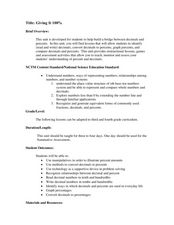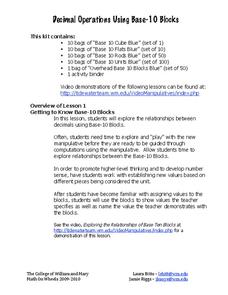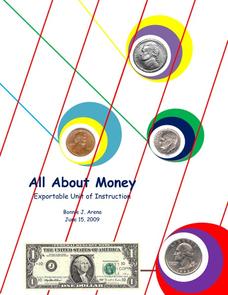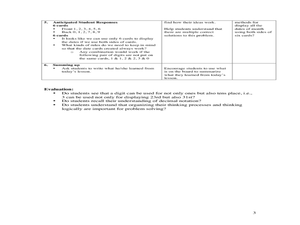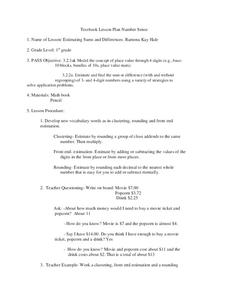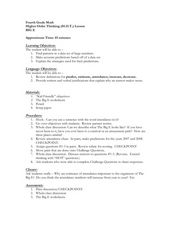Curated OER
Giving it 100%
Students build knowledge about the number relationships between decimals and percents as it relates to converting decimals into percents. In this decimal and percent instructional activity, students recognize equivalent forms of...
Curated OER
Comparing Two Digit Numbers Using Symbols
Second graders compare two digit numbers. In this comparing numbers lesson, 2nd graders discover greater than and less than symbols. Students read Five Little Monkeys Sitting In A Tree and use the story as a model for comparing numbers....
College of William and Mary
Decimal Operations Using Base 10 Blocks
Let's get this block party started and learn about decimals! Here are four main lessons that teach the operations with decimals while using base 10 blocks to provide a hands-on learning approach. Supplemental worksheets and other...
Overcoming Obstacles
Establishing What's Important
Being true to oneself can be difficult when faced with pressure from others. In this instructional activity, participants first list what they value and then role-play a series of scenarios that test these values. To conclude,...
EngageNY
Grade 5 Math Module 1, Topic F, Lesson 15
Remainders don't need to remain a mystery. The 16th of 18 parts in Grade 5 Math Module 1 continues the study of dividing decimals by a whole number. Scholars see how to rename the remainder to a smaller unit, such as when dividing 1.7 or...
Curated OER
All About Money
Few topics engage young mathematicians as much as learning about money. Through a series of shared readings and hands-on activities, children explore the US currency system, learning how to count money and calculate change as they create...
Curated OER
One Vs. One Hundred
Learners explore the concept of place value. They differentiate between digits and their values as it related to addition and subtraction. Through the use of technology and manipulatives students investigate the place value of digits by...
Curated OER
Comparing and Ordering Greater Numbers
Young scholars line up the digits of the numbers they are comparing in the correct manner. In this comparing numbers lesson, students learn to line numbers up correctly on a place value chart before comparing them. Young scholars then...
Curated OER
How many cards do we need to display the dates of the month on the wall?
Students determine how many number cards are needed to display the dates of the month. For this place value notation lesson, students write numbers on blank cards to see how many are needed of each number to makes all the dates of the...
Curated OER
Naming Numbers Through Hundred Millions And Comma Placement
Fifth graders name numbers through the hundred millions place and demonstrate where to correctly place the commas. Using a car place value line, they park cars with numbers on them in the correct place value spot. Students also read...
Curated OER
Place Value for Whole Numbers
Fourth graders, in groups, explore place value for whole numbers. They explore how to use base-ten materials to make sense of place value in the tens and ones column. They also explore whole-number patterns by using base-ten materials.
Curated OER
Number Sense
First graders practice rounding 4 digit numbers using place value concepts. In this estimating sums and differences lesson, 1st graders explore clustering, rounding, and front end estimation as methods for rounding decimals.
Curated OER
Place Value
Second graders use physical models to represent and demonstrate place value concepts by using base-ten blocks and hundreds charts. They compare numbers to see which number is smaller or larger and put numbers in order from smallest to...
Curated OER
A Method of Front-End Arithmetic
Teach the class how to add using front-end addition. They are given a shopping list and use it to practice adding from the largest place value to the smallest. Computational math and shopping, what fun!
Curated OER
Graphs
Students participate in a lesson exploring the concept of using graphs in various types of mathematical problems. They use negative and positive numbers in order to plot a graph. Students should use a place value chart for a reference...
Curated OER
The Number System
Learners explore how to multiply and divide by 10, 100, and 1000. In this computation lesson, students participate in an online activity using the interactive whiteboard. Learners generate sums by using dice.
Curated OER
Higher Order Thinking (H.O.T.) Lesson - BIG E
Fourth graders work with patterns while using large numbers. In this patterning lesson, 4th graders go over the definitions of the words: predict, estimate, attendance, increase, and decrease. They complete worksheets in which they track...
Curated OER
Add and Subtract within 1000
Here are some practice problems with adding and subtracting three-digit numbers. Scholars complete three addition problems and three subtraction problems. None of these involve carrying over or regrouping. There are only two numbers to...
Curated OER
Who Needs Numbers?
Students identify whole numbers through the one millions place. In this place value lesson, students read the book The Day Without Math and use place value mats to create numbers to the millions place. Students use base ten blocks during...
Curated OER
Tenths Models
In this math worksheet, students examine 4 identical squares with lines dividing them into ten columns. There are no directions for how to use this to teach place value.
Education World
High Flying Numbers
For this place value practice worksheet, students use their math skills to respond to 22 questions that require them to identify the place value of digits in 4, 5, and 6 digit numbers.
Curated OER
Full House
In this place value worksheet, 1st graders express different ways to show numbers. Students complete 6 problems demonstrating an understanding of the tens and the ones place.
Curated OER
Guess the Magic
In this place value instructional activity, students read each of 6 word clues and then write the number described. Example: Anna's number has 2 tens and 1 one (21).
Curated OER
Flying High
In this number sense worksheet, 2nd graders begin basic place value of ones and tens. Students complete four fill in the blank problems stating the number of groups and the total number that is shown in each picture.


